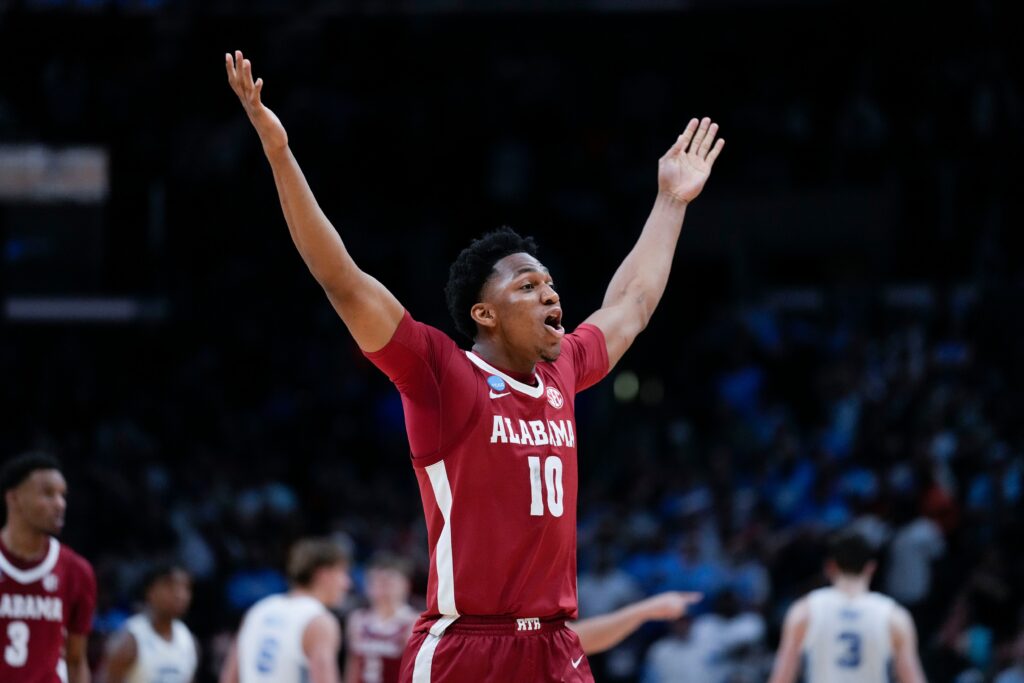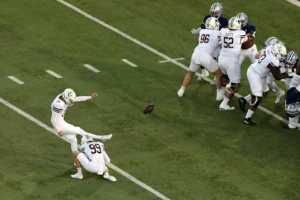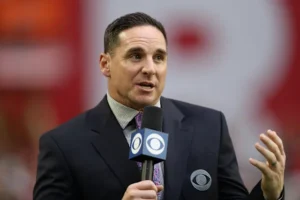
Although he may have left Alabama men’s basketball, Mouhamed Dioubate remained in the SEC.
In an offseason marked by high-profile transfers and dramatic roster overhauls, few moves have carried the quiet yet strategic significance of Mouhamed Dioubate’s decision to remain within the Southeastern Conference (SEC) following his departure from Alabama men’s basketball.
Dioubate, a 6-foot-7 forward who brought energy, defensive toughness, and rebounding prowess to Nate Oats’ program as a freshman, announced in early April that he was entering the NCAA transfer portal. A few weeks later, he made headlines again—this time for choosing to stay within the league by committing to South Carolina, a decision that could have ripple effects across the SEC.
A Promising Start in Tuscaloosa
Dioubate arrived in Tuscaloosa in 2023 as a four-star recruit out of Putnam Science Academy in Connecticut. Ranked as the No. 89 player in the nation and the No. 1 prospect from New York by multiple recruiting services, he was part of a highly touted Alabama recruiting class that also included Jarin Stevenson and Sam Walters. Known for his high motor, elite rebounding, and defensive intensity, Dioubate quickly became a fan favorite despite coming off the bench.
While he didn’t post gaudy numbers—averaging 3.7 points and 3.8 rebounds in 12.5 minutes per game—his impact went beyond the stat sheet. Dioubate was often inserted into games to change the tempo, spark fast breaks with his defensive activity, and provide physicality on the glass. His standout performance came in a late-season victory against Florida, where he posted a 9-point, 11-rebound effort, including five offensive boards that shifted momentum.
“He’s the kind of guy every coach loves,” Oats said during the season. “Plays hard, doesn’t care about stats, and does the dirty work.”
But as Alabama advanced to the Final Four and welcomed another star-studded recruiting class headlined by five-star forward Derrion Reid and top transfer portal targets, Dioubate saw the writing on the wall. More minutes would be hard to come by, and a change of scenery offered a path to a larger role.
Staying in the SEC: A Bold and Strategic Move
Rather than leave the conference entirely, Dioubate opted to join South Carolina, a team on the rise under head coach Lamont Paris. The Gamecocks, fresh off a 27-8 season and their first NCAA Tournament appearance since 2017, made it clear they were looking to upgrade their frontcourt depth and physicality—and Dioubate was a perfect fit.
“We’re thrilled to add Mouhamed to our program,” Paris said in a statement following the announcement. “His effort, athleticism, and competitive drive are exactly what we want our culture to be about. He’s played big minutes in huge games and understands what it takes to win at a high level in the SEC.”
The move makes sense on multiple levels. At South Carolina, Dioubate will likely compete for a starting forward spot, possibly next to star center Collin Murray-Boyles, giving the Gamecocks a tough, athletic frontcourt pairing. With wing Myles Stute graduating and BJ Mack testing the NBA Draft waters, there’s room for Dioubate to expand his offensive role and become a defensive anchor.
Moreover, staying in the SEC gives Dioubate continuity in terms of competition level, style of play, and exposure. The SEC has established itself as one of the premier basketball conferences in the country, boasting elite coaches, NBA talent, and raucous environments. Dioubate, already battle-tested against the likes of Kentucky, Tennessee, and Arkansas, won’t need to adjust to a different level of play.
What South Carolina Gains
Dioubate’s addition immediately raises South Carolina’s ceiling for the 2025 season. One of the few holes in Paris’ rotation last season was consistent rebounding and rim protection behind Murray-Boyles. Dioubate offers both.
In just limited minutes at Alabama, Dioubate posted a rebounding rate that ranked in the top 10% of all SEC players. His ability to grab offensive rebounds—often creating extra possessions on hustle plays—was crucial in Alabama’s run through the SEC Tournament. While not yet a reliable perimeter shooter, he showed improved touch near the basket and flashes of playmaking from the high post.
“Mouhamed is the kind of player who makes winning plays,” said one SEC assistant coach. “He might not score 20, but he’ll get you a stop, a loose ball, and an extra possession—and that’s often what separates good teams from great ones.”
Paris has emphasized physicality and defense since taking over the program in Columbia. With Dioubate in the fold, the Gamecocks can continue their gritty identity while adding someone who has played under one of the fastest-paced, three-point-heavy systems in college basketball.
What Alabama Loses
From Alabama’s perspective, Dioubate’s departure is a classic case of good players getting squeezed out by the numbers. With the Tide bringing in Reid, Stevenson returning for a likely sophomore jump, and Walters showing promise late in the year, the frontcourt became a bit crowded. Combine that with Alabama’s pursuit of veteran bigs in the portal and the possibility of Grant Nelson returning, and Dioubate likely saw fewer opportunities ahead.
Still, losing a player of his caliber hurts, especially when that player goes to a conference rival. Dioubate embodied many of the values Oats has preached—hard-nosed defense, relentless effort, and unselfishness. He also had two more years of eligibility and could have blossomed into a starter by his junior season.
Alabama fans were quick to praise Dioubate on social media, wishing him well while lamenting his departure. “You never doubted Dioubate’s heart,” one fan wrote on Twitter. “Best of luck—just not when you play us.”
SEC Scheduling Drama?
Now that Dioubate is a Gamecock, all eyes will be on the Alabama-South Carolina matchup next season. The conference’s evolving schedule—with 16 teams following the additions of Texas and Oklahoma—means some teams only play once a year. Still, there’s a high probability that Alabama and South Carolina will face off at least once, and the game will carry extra weight.
While Dioubate has not made any inflammatory comments about his departure, players often bring a little extra motivation when facing former teams. He’ll know the tendencies of Oats’ system. He’ll know the strengths and weaknesses of his former teammates. That’s valuable intel for Paris and his staff.
The SEC is no stranger to emotional homecomings and revenge narratives. Just last season, Vanderbilt’s Tyrin Lawrence had a monster performance against Tennessee, the team he grew up watching. Dioubate could be next in line for such a storyline.
Development and Long-Term Outlook
From a developmental standpoint, Dioubate is still a work in progress—but a highly promising one. His NBA ceiling remains uncertain due to his limited offensive game, but his defensive instincts, athleticism, and motor give him a professional foundation. At South Carolina, he’ll likely get more touches and freedom to work on his face-up game, midrange shooting, and passing—areas where he showed some promise at Alabama.
He also benefits from playing under Lamont Paris, whose reputation for player development—particularly with big men—has quietly grown in coaching circles. If Dioubate can add a consistent jumper and expand his offensive bag, there’s no reason he can’t be an All-SEC contributor and earn NBA or overseas interest.
Bigger Picture: The SEC’s Transfer Ecosystem
Dioubate’s move is part of a broader trend in college basketball, particularly within the SEC, where intra-conference transfers are becoming more common. Previously viewed as taboo, transferring to a league rival is now standard practice, especially with NIL incentives and players looking for the best developmental and exposure opportunities.
It also raises strategic implications. Programs now have to prepare for former players returning with inside knowledge, and coaches must navigate portal decisions carefully to avoid losing culture pieces like Dioubate. For Alabama, the cost of recruiting over a player could be seeing him flourish with a rival.
For South Carolina, it’s a calculated win—an SEC-tested forward with upside, toughness, and two years of eligibility. Dioubate won’t be asked to carry the offense but will play a vital role in bridging the gap between the Gamecocks’ gritty defensive identity and their quest to rise into the league’s upper echelon.
Mouhamed Dioubate’s decision to remain in the SEC after leaving Alabama may not have generated the national headlines of a five-star recruit or All-American transfer, but it might prove to be one of the more important roster moves in the conference this offseason. In an era of constant change and rapid movement, Dioubate’s choice represents a blend of loyalty to the league, belief in his abilities, and trust in a coaching staff that sees his full potential.
Whether he’s grabbing a key rebound, diving on the floor for a loose ball, or defending the opposing team’s best forward, Dioubate will be making his presence felt. And now, he’ll be doing it in garnet and black.
For Alabama fans, it’s bittersweet. For South Carolina, it’s a coup. For Dioubate? It’s the next chapter in a promising career—still in the SEC, still playing at a high level, and still with something to prove.





